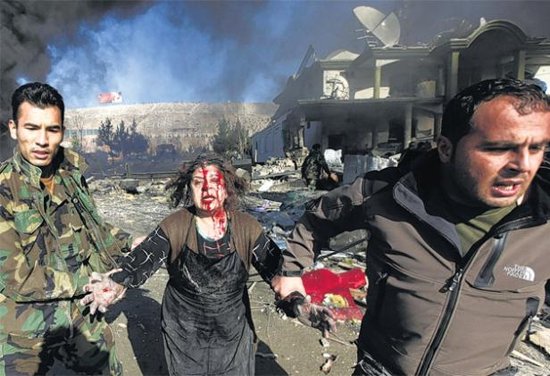By Daniel S. Morgan
America needs to reckon with the purpose of war and lives lost in Afghanistan. There is no reason that more American service members should lose their lives there. The real strategic mistake is not withdrawing too fast. It is remaining there or withdrawing slowly and painfully because of hubris or a sunk cost fallacy. This conflict has cost the American taxpayer trillions of dollars, while the blood of its sons and daughters — a means to a political end — has not resulted in success.
The United States spends $45 billion a year in Afghanistan, according to the 2019 High Risk Report by the Special Inspector General for Afghanistan Reconstruction (SIGAR). At one point, the number surpassed $100 billion, totaling approximately $780 billion since 2001. These amounts are attributed to Department of Defense (DOD) costs in Afghanistan, not other U.S. government departments, such as the State Department and Veterans Administration (VA). If one includes other costs outside of DOD and considers the start date of 9/11, the cost could exceed $6 trillion.
Despite 17 years of governance development, corruption remains rampant in Afghanistan. In 2018, Afghanistan ranked 172 out of 180 of the least corrupt nations, which means very corrupt. Afghanistan scored 16 of 100 points on the 2018 Corruption Perceptions Index. Afghanistan averaged 14.23 points from 2005 until 2018, reaching a high of 25 points in 2005 and a record low of 8 points in 2012. Apparently, Afghanistan was less corrupt before the U.S. committed itself to Afghanistan and irresponsibly flooded it in money. The investment in anti-corruption and other reconstruction efforts clearly failed to achieve an expected or modicum level of value in return in 17 years.

A victim is taken away from the site of a suicide car bomb attack in Kabul on Dec. 14, 2009. (Photo: Reuters)
The Afghan National Defense and Security Forces (ANDSF) lack capability and capacity to defeat the Taliban. They also still depend on donor support of $4 billion to $5 billion per year to fund sustainment, equipment, infrastructure and training costs. Currently, Afghan attrition, which includes desertions, outpaces recruitment. Since 2014, over 45,000 ANDSF have been killed in combat operations. The ANDSF cannot independently sustain their logistics and maintenance efforts more than 50 percent of the equipment provided to them by DOD. After 17 years of U.S. direct support, the ANDSF still experience insufficient personnel, a resilient insurgency, internal corruption and poor logistics and maintenance.
Afghanistan will always struggle with insurgent organizations despite any political settlement. Pakistan will remain a sanctuary and provide external support for the Taliban because Afghanistan provides strategic depth for Pakistan against their arch enemy, India. No one should expect the multiple different insurgent groups to comply with any treaty. It is folly for any U.S. leader to think otherwise. Pakistan may limit, or possibly cease, support for insurgent groups only when the Afghan government allies itself with Pakistan over the U.S. and western governments.
America needs to reckon with the death toll of the war in Afghanistan, as well as counterterrorism and counterinsurgency strategies since 9/11. According to the Defense Department, operations in support of Afghanistan have resulted in 2,424 military and DOD civilians killed and 20,530 wounded, out of a total of 7,005 killed and 52,864 wounded if we add operations in support of Iraq. These numbers do not include the tens of thousands of Afghan and Iraqi civilians killed or wounded over the past two decades. In addition to these losses, the VA must provide services and enable the integration of hundreds of thousands of veterans. These lives, combined with cost to the American taxpayer, require the administration and Congress to end the Afghan commitment and bring them home.
Political fear of another 9/11 attack emanating from Afghanistan, however, prevents an administration decision to withdraw, despite no real intelligence or confidence that this would happen. Any mastermind attack like 9/11 could emanate from plenty of other ungoverned spaces in the world. Fortunately, the United States and its allies and partners have created an exceptional network to target extremism globally. U.S. policy should rely on this network and focus more on preventing violence on the American homeland; deterring conflict in the Middle East; and helping reduce the exponential numbers of refugees living in despair.
Fortunately, the Afghan peace negotiations are progressing and must lead to the withdrawal of U.S. forces — and soon. The treaty should not allow a 100 percent abandonment of U.S. personnel. The U.S. should maintain official State Department presence, as it has in other countries, and a small counterterrorism advisory force. Soldiers no longer should be placed in security operations that could result in more of them killed in action.
Many challenges, however, could prevent a treaty resolution or its sustainability — for example, failed reintegration of Taliban fighters, no improvement in civil policing, and poor oversight of foreign financial assistance each could undermine any peace agreement.
The strategic mistake may have occurred by remaining in Afghanistan, but it would be another strategic mistake to think that any deliberate or hasty withdrawal would result in anything more positive. As William Penn said, “Time is what we want most, but what we use worst.” Time is up.
Daniel S. Morgan is a retired U.S. Army infantry colonel and senior management consultant. He deployed as a commander and operations officer to Iraq and Afghanistan multiple times while assigned to the 101st Airborne Division and 10th Mountain Division. He recently served as a senior fellow and is a life member of the Council on Foreign Relations. He is a co-author of “Chasing the White Rabbit: A Discovery of Leadership in the 21st Century.”



